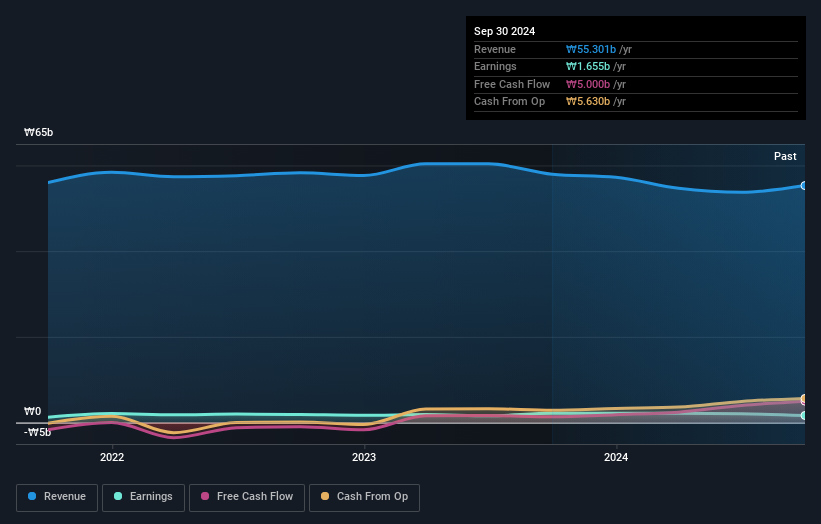- South Korea
- /
- Consumer Durables
- /
- KOSDAQ:A024940
Pulling back 13% this week, PN Poong Nyun's KOSDAQ:024940) five-year decline in earnings may be coming into investors focus

It's been a soft week for PN Poong Nyun Co., Ltd. (KOSDAQ:024940) shares, which are down 13%. But that doesn't undermine the fantastic longer term performance (measured over five years). In fact, during that period, the share price climbed 333%. Impressive! Arguably, the recent fall is to be expected after such a strong rise. Only time will tell if there is still too much optimism currently reflected in the share price.
Since the long term performance has been good but there's been a recent pullback of 13%, let's check if the fundamentals match the share price.
Check out our latest analysis for PN Poong Nyun
While the efficient markets hypothesis continues to be taught by some, it has been proven that markets are over-reactive dynamic systems, and investors are not always rational. One way to examine how market sentiment has changed over time is to look at the interaction between a company's share price and its earnings per share (EPS).
During five years of share price growth, PN Poong Nyun actually saw its EPS drop 21% per year.
This means it's unlikely the market is judging the company based on earnings growth. Since the change in EPS doesn't seem to correlate with the change in share price, it's worth taking a look at other metrics.
We doubt the modest 0.4% dividend yield is attracting many buyers to the stock. The revenue reduction of 0.3% per year is not a positive. It certainly surprises us that the share price is up, but perhaps a closer examination of the data will yield answers.
The graphic below depicts how earnings and revenue have changed over time (unveil the exact values by clicking on the image).

Take a more thorough look at PN Poong Nyun's financial health with this free report on its balance sheet.
What About Dividends?
When looking at investment returns, it is important to consider the difference between total shareholder return (TSR) and share price return. Whereas the share price return only reflects the change in the share price, the TSR includes the value of dividends (assuming they were reinvested) and the benefit of any discounted capital raising or spin-off. It's fair to say that the TSR gives a more complete picture for stocks that pay a dividend. We note that for PN Poong Nyun the TSR over the last 5 years was 347%, which is better than the share price return mentioned above. And there's no prize for guessing that the dividend payments largely explain the divergence!
A Different Perspective
We're pleased to report that PN Poong Nyun shareholders have received a total shareholder return of 5.6% over one year. And that does include the dividend. However, that falls short of the 35% TSR per annum it has made for shareholders, each year, over five years. Potential buyers might understandably feel they've missed the opportunity, but it's always possible business is still firing on all cylinders. It's always interesting to track share price performance over the longer term. But to understand PN Poong Nyun better, we need to consider many other factors. To that end, you should learn about the 3 warning signs we've spotted with PN Poong Nyun (including 2 which are a bit concerning) .
We will like PN Poong Nyun better if we see some big insider buys. While we wait, check out this free list of undervalued stocks (mostly small caps) with considerable, recent, insider buying.
Please note, the market returns quoted in this article reflect the market weighted average returns of stocks that currently trade on South Korean exchanges.
New: Manage All Your Stock Portfolios in One Place
We've created the ultimate portfolio companion for stock investors, and it's free.
• Connect an unlimited number of Portfolios and see your total in one currency
• Be alerted to new Warning Signs or Risks via email or mobile
• Track the Fair Value of your stocks
Have feedback on this article? Concerned about the content? Get in touch with us directly. Alternatively, email editorial-team (at) simplywallst.com.
This article by Simply Wall St is general in nature. We provide commentary based on historical data and analyst forecasts only using an unbiased methodology and our articles are not intended to be financial advice. It does not constitute a recommendation to buy or sell any stock, and does not take account of your objectives, or your financial situation. We aim to bring you long-term focused analysis driven by fundamental data. Note that our analysis may not factor in the latest price-sensitive company announcements or qualitative material. Simply Wall St has no position in any stocks mentioned.
About KOSDAQ:A024940
PN Poong Nyun
Manufactures and sells kitchenware products in South Korea.
Flawless balance sheet low.


